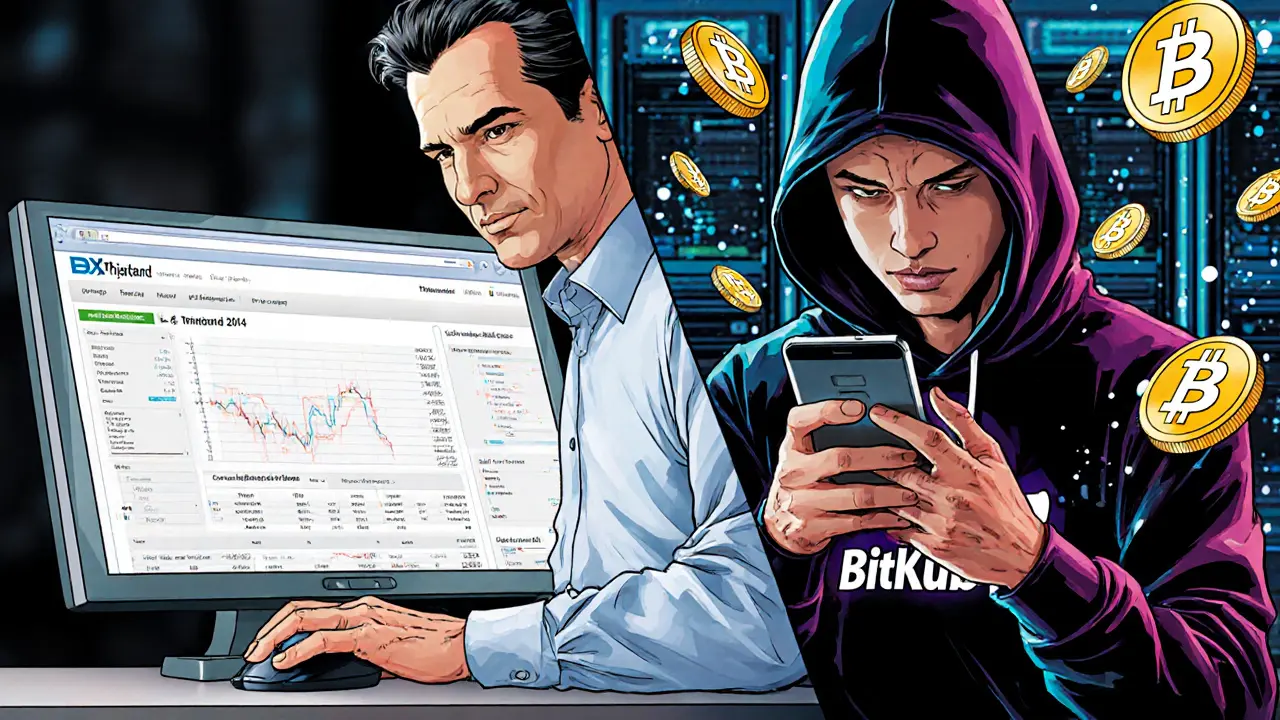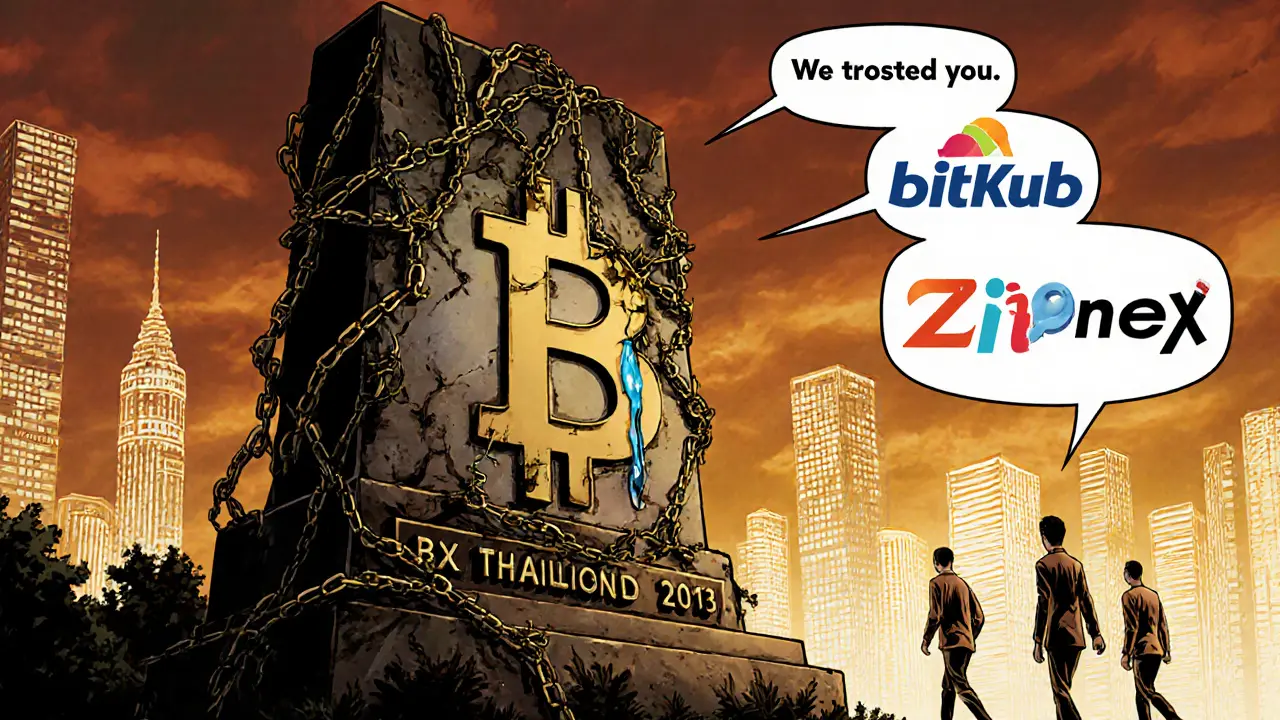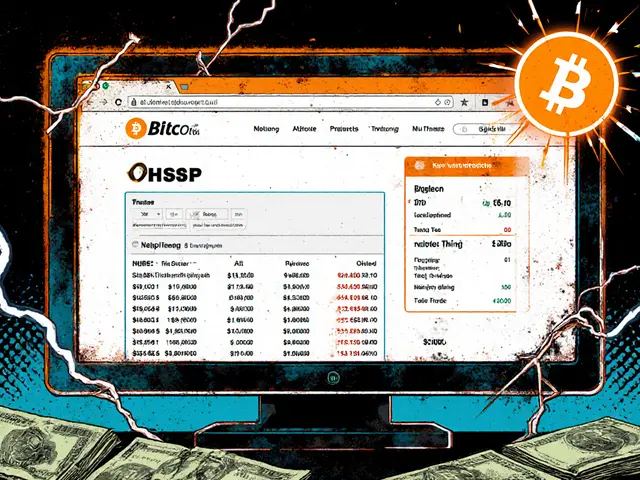Back in 2018, if you lived in Thailand and wanted to buy Bitcoin with Thai Baht, BX Thailand was one of the first names you’d hear. It wasn’t flashy. It didn’t have a mobile app. And it sure didn’t offer futures trading or staking. But for years, it was reliable. Simple. And trusted. Today, the website bx.in.th doesn’t load. The servers are offline. The company is gone. And yet, understanding what happened to BX Thailand still matters - especially if you’re thinking about using any crypto exchange in Southeast Asia.
What Was BX Thailand?
At its peak, it handled around $15 million in daily trading volume, mostly between BTC and THB. That’s not huge by global standards, but in Thailand’s early crypto market - where regulation didn’t exist until 2018 - it was massive. By 2018, it had about 150,000 active users and controlled roughly 15% of the country’s crypto trading volume.
How It Worked
The platform was basic, but functional. There were three main sections on the trading page: recent trades, buy orders, and sell orders. You could see the price in THB, how much BTC was being offered, and how much people were willing to pay. It had two chart types - price and depth - which were enough for casual traders.
There was no mobile app. No advanced order types like limit or stop-loss beyond basic market orders. No staking. No lending. No NFT marketplace. You couldn’t even trade Ethereum against USDT. The only real pairs were THB-based, with BTC/THB making up 85% of all trades.
Deposits in Thai Baht were free via bank transfer. Crypto deposits were free too. Withdrawals cost a small fee: 0.001 BTC for Bitcoin, 0.01 ETH for Ethereum, and 25 THB for cashouts to your Thai bank account. Trading fees were flat at 0.25% for both makers and takers - a bit higher than newer Thai exchanges like BitKub, which dropped fees to 0.15% in 2019, but still fair for the time.
Security: The One Thing They Got Right
BX Thailand didn’t have the fanciest interface, but it took security seriously. The company claimed to have built its entire platform from scratch - no open-source exchange code. They said they knew every line of their code. That’s rare. Most exchanges use modified versions of open-source software like CryptoExchange or 3Commas. BX Thailand didn’t.
Wallets were kept offline in cold storage - 80-90% of user funds were never online. Only company owners had physical access to the servers. All wallet servers were encrypted and blocked from any outside connections. The website frontend ran on separate machines, so even if hackers broke into the front end, they couldn’t touch the wallets.
They claimed to be a full reserve exchange - meaning every THB or BTC you deposited was fully backed. Bitcoin Co. Ltd. even pledged to cover losses if anything went wrong. That kind of transparency was unheard of in 2015. Most exchanges back then were just running on faith.

Why It Failed
BX Thailand didn’t die because of a hack. It didn’t collapse because of fraud. It died because it stopped evolving.
By 2019, Thailand’s crypto market exploded. The government passed the Digital Asset Decree, creating a formal licensing system under the SEC. New players like BitKub, Satang Pro, and Zipmex came in with better tech, mobile apps, more coins, and faster support.
BitKub, for example, offered over 50 cryptocurrencies. BX Thailand only supported 12. BitKub had a slick app. BX Thailand had a clunky website that didn’t work well on phones. BitKub had customer support that responded in hours. BX Thailand took 3-5 business days - sometimes longer during high-volume periods.
Even worse, BX Thailand didn’t invest in updates. Their interface looked like it was built in 2014. No margin trading. No recurring buys. No API for bots. No educational content. While competitors were adding staking and yield products, BX Thailand was still asking users to manually transfer THB from their bank account to buy Bitcoin.
By early 2020, its market share had dropped from 15% to just 5%. Revenue fell. Users left. And without enough capital to catch up, Bitcoin Co. Ltd. shut it down quietly. No press release. No announcement. Just a 404 error.
What Users Said
People who used BX Thailand for years generally liked it - if they were only trading BTC and THB. On BitTrust and Reddit, users praised its reliability. One user wrote in June 2019: “I used this website to buy and sell Bitcoin & Altcoin for over 1 year. It’s reliable.”
But complaints piled up. Customer service was slow. The interface was confusing if you didn’t speak Thai - only 60% of the site was in English. Withdrawals sometimes took days, especially after a spike in demand. And there was no way to contact support outside of email.
Trustpilot’s archived reviews (2020) showed 78% of positive feedback mentioned “easy Thai Baht deposits.” That was its strength. But 62% of negative reviews pointed to “no mobile app” and “slow support.”
It earned a 3.8/5 average rating and a 7.2/10 Trust Score on CoinGecko - decent, but not great. For a platform that claimed to be secure and trustworthy, those numbers were a warning sign.

The Bigger Lesson
BX Thailand wasn’t a scam. It wasn’t a Ponzi scheme. It was a honest, hardworking company that got left behind.
It helped Thai people trust crypto. It proved you could build a legal, regulated exchange in Thailand. It showed that local fiat integration was possible. But it didn’t adapt. It didn’t innovate. It didn’t listen.
Today, Thailand’s crypto market is dominated by BitKub, Satang Pro, and Zipmex - all of which have apps, support dozens of coins, offer staking, and respond to support tickets in under 24 hours. They learned from BX Thailand’s mistakes.
If you’re looking at a crypto exchange now - whether in Thailand, Vietnam, or Indonesia - ask yourself: Is this platform still growing? Or is it just holding on?
BX Thailand’s legacy isn’t in its code or its servers. It’s in the fact that thousands of Thai people bought their first Bitcoin on it. And that’s something worth remembering.
What Happens to Your Funds When an Exchange Dies?
If you still had money on BX Thailand when it shut down in 2020, you lost it. There was no refund. No recovery process. No legal recourse. The company dissolved quietly, and user funds were never returned.
This is why you should never keep large amounts on any exchange - especially smaller, local ones without clear financial backing. Use exchanges as gateways to buy crypto, then move your coins to a personal wallet. BX Thailand’s shutdown is a textbook example of why that rule exists.
Where to Trade Crypto in Thailand Today
If you’re in Thailand and want to trade crypto now, here are your best options:
- BitKub - Largest exchange in Thailand. 50+ coins, mobile app, staking, 24/7 support. Fees start at 0.15%.
- Satang Pro - Clean interface, good for beginners. Supports THB, USD, and EUR. Strong security.
- Zipmex - Offers interest accounts and derivatives. Regulated under Thai SEC.
All three are licensed by the Thai SEC. All have apps. All respond to support tickets quickly. None of them are perfect - but they’re all alive.
Is BX Thailand still operating?
No, BX Thailand ceased all operations in early 2020. The website bx.in.th now shows a 404 error, and the company has been dissolved. All trading, deposits, and withdrawals have been permanently disabled.
Was BX Thailand a scam?
No, BX Thailand was not a scam. It was a legitimate exchange that operated legally under Thailand’s evolving crypto rules. It had strong security practices, full reserves, and transparent fee structures. It shut down because it couldn’t compete with better-funded rivals - not because it stole user funds.
Can I recover my funds from BX Thailand?
No, there is no way to recover funds from BX Thailand. The company dissolved in 2020 without a recovery plan. User assets were never returned. This is why you should never keep large amounts of crypto on any exchange long-term.
Why did BX Thailand fail when other Thai exchanges succeeded?
BX Thailand failed because it didn’t innovate. While competitors like BitKub added mobile apps, staking, and dozens of coins, BX Thailand stuck with a basic website and only 12 cryptocurrencies. It had no marketing budget, no mobile app, and slow customer service. As Thailand’s crypto market grew, BX Thailand couldn’t keep up.
What was BX Thailand’s biggest strength?
Its biggest strength was trust. It was one of the first exchanges in Thailand to offer safe, regulated THB-to-crypto trading. Its security practices - cold storage, in-house code, and full reserves - were ahead of most local competitors at the time. Many Thai users trusted it because it felt reliable, even if it was outdated.
Should I use a local Thai crypto exchange today?
Yes - but only if it’s licensed by the Thai SEC. BitKub, Satang Pro, and Zipmex are all regulated and offer better features than BX Thailand ever did. Always use exchanges with apps, fast support, and clear fee structures. And never leave large amounts on them - move your crypto to a personal wallet after buying.


Jenny Charland
November 24, 2025 AT 01:05preet kaur
November 24, 2025 AT 20:35Emily Michaelson
November 26, 2025 AT 08:05Anne Jackson
November 26, 2025 AT 20:48David Hardy
November 27, 2025 AT 14:56Dave Sorrell
November 27, 2025 AT 15:38Sky Sky Report blog
November 28, 2025 AT 08:06stuart white
November 29, 2025 AT 17:39Belle Bormann
December 1, 2025 AT 10:53Jody Veitch
December 3, 2025 AT 06:32Omkar Rane
December 3, 2025 AT 15:28Daryl Chew
December 5, 2025 AT 15:19Tyler Boyle
December 6, 2025 AT 14:56jocelyn cortez
December 8, 2025 AT 08:57Lisa Hubbard
December 10, 2025 AT 08:04asher malik
December 10, 2025 AT 09:39Rajesh pattnaik
December 11, 2025 AT 08:41Amanda Cheyne
December 11, 2025 AT 20:39John Borwick
December 12, 2025 AT 20:46Matthew Prickett
December 14, 2025 AT 13:01